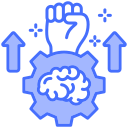Emotional resilience is the ability to adapt to stress, adversity, and change while maintaining a sense of inner balance and well-being. Through intentional self-improvement, you can strengthen your resilience, gain deeper self-understanding, and develop adaptive skills to manage life’s challenges. This page explores key strategies to support your journey towards greater emotional strength, focusing on adaptability, self-awareness, healthy habits, and positive relationships.
Incorporating mindfulness into your everyday routine helps anchor you in the present and nurture a compassionate, non-reactive stance towards emotional discomfort. This can involve simple practices like mindful breathing, sensory observation, or brief body scans throughout the day. These regular moments of awareness not only reduce the impact of stressors, but also train your brain to respond to challenges in a calmer, more deliberate manner. Over time, daily mindfulness cultivates a resilient mindset, allowing you to recognize emotions as temporary experiences rather than overwhelming obstacles.


Journaling for Personal Insight
Journaling serves as a practical tool for self-reflection and growth by providing a private space to explore emotions, thoughts, and reactions to daily events. Writing about your experiences enables you to process them more effectively and uncover recurring themes or triggers in your responses. Over time, the act of journaling helps you gain heightened self-awareness, clarify your values, and track your progress in developing emotional resilience. When practiced consistently, it becomes a catalyst for positive change and greater self-understanding.

Engaging in Honest Self-Assessment
Honest evaluation of your strengths, weaknesses, and habitual responses is critical for effective self-improvement. This practice involves asking yourself probing questions about your beliefs, motivations, and how you react under pressure. By being sincerely open about your limitations and areas where you struggle, you can set realistic goals and strategies for overcoming obstacles. Self-assessment drives accountability, fosters learning, and empowers you to take intentional steps toward emotional resilience.

Seeking Constructive Feedback
Inviting feedback from trusted peers, mentors, or professionals offers valuable external perspectives on your emotional responses and coping strategies. Feedback helps highlight blind spots—patterns or tendencies you may not recognize on your own. By viewing feedback as an opportunity for growth rather than criticism, you can deepen your self-awareness and develop new approaches for handling challenging situations. This openness to input enriches your journey of self-improvement and strengthens your capacity for resilience.
Establishing Healthy Habits and Routines
Quality sleep is an essential building block for emotional resilience, as it directly influences mood regulation, cognitive performance, and stress tolerance. When you consistently get adequate, restorative rest, you equip your mind to process emotions efficiently and make sound decisions even in challenging times. Developing evening routines that promote relaxation and healthy sleep hygiene can dramatically impact your ability to recover from setbacks and sustain self-improvement efforts.

